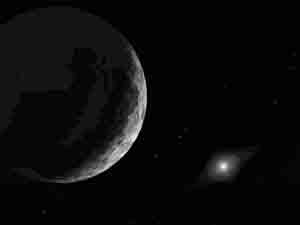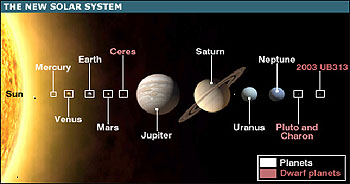|
A new definition for 'planet' that excludes Pluto is causing much controversy.
by Christopher H. Wortley
 Photo credit:
International Astronomical Union/Lars Holm Nielsen
Photo credit:
International Astronomical Union/Lars Holm Nielsen
What is a
planet? Astronomers voted for a new defintion of a planet
during the 2006 General Meeting of the International Astronomy
Union
|
|
Schoolchildren now have it easier:
they only have to memorise the names of eight planets. On August
24, 2006, a vote by the International Astronomical Union (IAU) at
their 2006 General Assembly in Prague saw Pluto stripped of its
planet status. For fans of Pluto, it was a sad occasion. But it
all came about because astronomers have never really formalised
what a planet actually is - until now.
The debate started after the recent discovery of new objects in our solar system that were larger than Pluto. A Planet Definition Committee, comprised of historians, writers and astronomers and chaired by Harvard astronomer and historian Owen Gingerich met in July to draft a new planetary definition. The much-publicised proposal to add three new planets to our solar system failed to gain approval by astronomers.
A celestial body in our solar system must now meet three conditions to be considered a planet. It must (a) be in orbit around the sun, (b) have sufficient mass for its self-gravity to overcome rigid body forces so that it assumes a hydrostatic equilibrium (nearly round) shape, and (c) have enough mass to have cleared the neighbourhood around its orbit.
Pluto does not have enough mass to
satisfy the third condition, but it does fit into a new category
of 'dwarf' planet, which describes a non-satellite object with not
enough mass to clear its orbit. Of the three new planet contenders
- Ceres, Eris and Charon - Ceres and Eris have also been placed
in this category and Charon simply remains Pluto's moon.
Pluto's Status
It has long been clear that Pluto is different from the other planets. Not only is it much smaller - about 1600 miles in diameter - but its elongated orbit is tilted in relation to the other planets, causing it to be nearer to the sun than Neptune for part of its 248-year journey.
 Photo credit: NASA/JPL/Caltech
Photo credit: NASA/JPL/Caltech
An artist's rendition of Eris, one of the new dwarf planets (left) with the sun shining in the distance (right).
|
The discovery of an object nicknamed 'Xena' (but now officially named 'Eris') by a team led by Mike Brown of CalTech University put Pluto under pressure. Using the Hubble Space Telescope, they showed that this icy Kuiper Belt object, which is 10 billion miles from the sun, was slightly larger than Pluto. Astronomers reasoned that if Pluto is a planet, then so is Eris. But what if, as is likely using the ever-improving instruments, they make further discoveries in the Kuiper Belt? To avoid ending up with a large and confusing number of planets, many of which might not merit the title, the committee chose a more restrictive definition.
Definition Doubts
By declaring Pluto the first in a special
subcategory, astronomers may have hoped to console Pluto fans, but
online petitions indicate that they may not have succeeded. At the
meeting, disagreements were also evident, most notably between dynamicists
and geologists. The meeting failed in a close vote to approve the
name 'Plutonians' for the dwarf planets orbiting beyond Neptune,
which was an alternative to the original suggestion, 'Plutons' to
which geologists objected. Gingerich said that the process of arriving
at a workable resolution was like trying to do diplomacy in the
Middle East. Of 10,000 astronomers, only 428 were present for the
vote, and on the last day of the conference, a minority voted to
add the third clarifying criterion.
 Photo credit: International Astronomical Union/Martin Kornmesser
Photo credit: International Astronomical Union/Martin Kornmesser
Our new
solar system, with eight classic planets and three dwarf
planets (the status of Pluto's moon Charon is still being
considered).
|
For 100 hours after the decision was
made, a petition circulated amongst planetary scientists and astronomers
as evidence of the strength of feeling. It said, 'We, as planetary
scientists and astronomers, do not agree with the IAU's definition
of a planet, nor will we use it. A better definition is needed.'
The petition was signed by 300 prominent planetary science experts.
Even Gingerich is not satisfied with
the new category of 'dwarf' planets and describes the term as clumsy
and linguistically preposterous. Likewise, Alan Stern, Principal
Investigator of NASA's New Horizons mission to Pluto, describes
the decision as a 'terrible mess' and dislikes the unscientific
idea of putting a limit on the number of planets. Although the third
criterion is intended to cover objects orbiting in the Asteroid
or Kuiper Belts, Stern dislikes it and claims that other planets
have also failed to either absorb or knock away their orbital debris.
But coming up with a new definition was no easy matter. The committee was specifically charged with considering social and historical context when coming up with defining criteria. The choice of 'roundness' as a criterion for planetary status reflects the committee's sensitivity to the broad cultural significance and use of the term. Likewise, moons were maintained as distinct entities from planets.
Robin Catchpole of Cambridge University
Institute of Astronomy believes that the new definition is the lesser
of two evils. Although he would have preferred to keep Pluto on
historical grounds, he had been unhappy about the original proposal
to allow 12 planets. He would have preferred the term 'minor planet'
to the term 'dwarf planet', but believes that the names given to
objects are not really that important.
Perhaps the IAU's task was an impossible
one. As far as the public was concerned, the scientists were in
the familiar position of being unable to provide the certain and
watertight definition required of them. Conversely, some astronomers
feel they accommodated cultural context at the expense of good science.
With the IAU currently considering
a dozen candidate dwarf planets, the argument about how to categorise
them may have only just begun.
For more information:
Petition Protesting the IAU Planet Definition
http://www.ipetitions.com/petition/planetprotest/
Pluto Petition
http://www.plutopetition.com/
|
